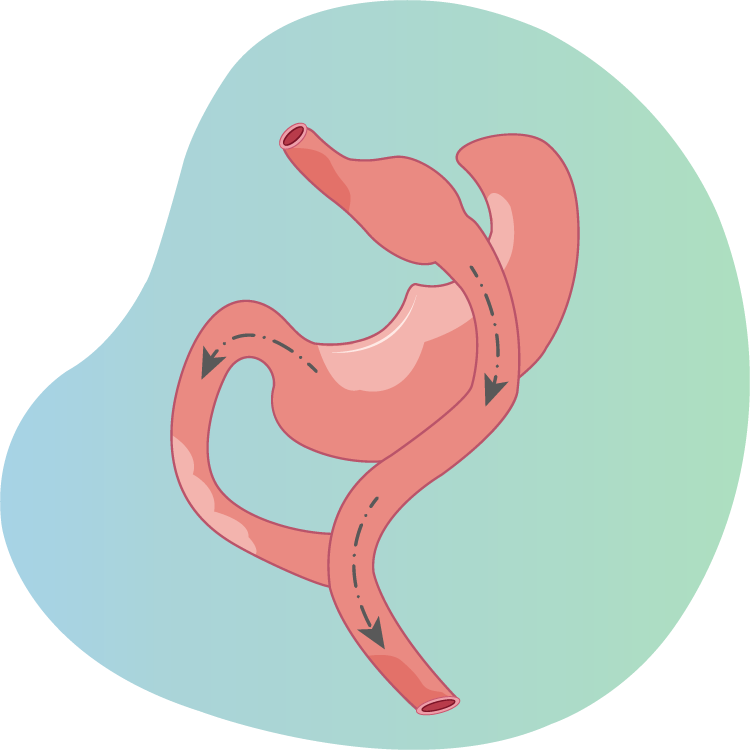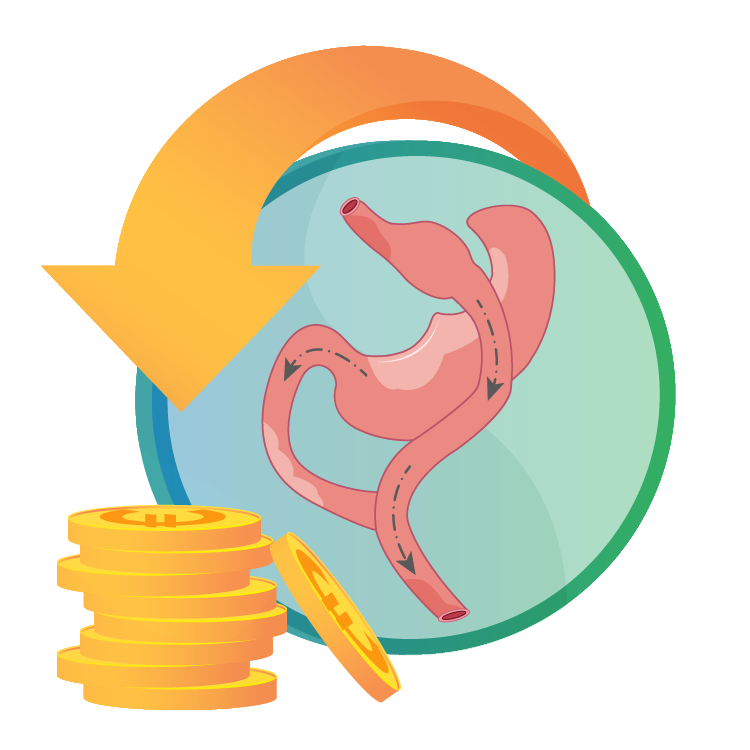Gastric Bypass Turkey – Cost: Discover gastric bypass at Get Slim in Türkiye. Affordable prices, first-class service and a smooth process await you.
Gastric Bypass Turkey – Costs £2,890 or $3,590
1 - 3 Hours
4 Nights
From £2,890 or $3,590
The Gastric Bypass is a time-tested surgical procedure for weight reduction. By rerouting a portion of the digestive tract and reducing stomach size, it aids patients in consuming less and burning calories more efficiently. This procedure not only offers significant weight loss advantages, but can also alleviate associated conditions like Type-2 Diabetes. As one of the leading techniques in bariatric surgery, the gastric bypass promises long-lasting results and enhanced well-being.
The gastric bypass or mini-gastric bypass is an effective procedure to achieve sustainable weight loss. In this surgical intervention, a small portion of the stomach is separated, reducing its capacity and thereby limiting food intake. Additionally, the digestive tract is rerouted, bypassing a large part of the stomach and sections of the small intestine. This results in quicker satiety and a reduced caloric intake. Many patients report significant weight losses within the first year post-surgery and an enhanced quality of life. However, it’s crucial to emphasize that this surgical procedure works best when paired with a healthy diet and regular physical activity.

Opting for a gastric bypass overseas is becoming increasingly popular, driven in part by the often more affordable costs and highly skilled surgeons available in many international clinics. Countries like Türkiye, Poland, and the Czech Republic have specialized in medical tourism, offering state-of-the-art facilities, trained staff, and exceptional medical services. Typically, these procedures are available discounted the cost compared to Western European countries like Germany, Switzerland, or the UK, and the USA. However, it’s crucial to conduct thorough research beforehand, read patient reviews, and ensure the clinic is internationally accredited. This ensures a high standard of patient care and safety during and post-obesity surgery.
Opting for a gastric bypass at GetSlim in Türkiye/Antalya offers a combination of top-tier medical expertise with an outstanding value for money. The renowned surgeons and cutting-edge medical facilities uphold the highest standards of safety and quality. Beyond the medical dimension, patients benefit from an all-inclusive service package, ensuring their stay is both comfortable and carefree. With GetSlim Türkiye, weight loss set against the serene backdrop of Antalya becomes an entirely positive journey.

Gastric Bypass Türkiye – Cost: At GetSlim in Türkiye/Antalya, we offer you a gastric bypass at an unbeatable price of £2,890 or $3,590. This all-inclusive package goes beyond just medical treatments to ensure a secure stay in Antalya. With our highly qualified bariatric surgeons for obesity and a comprehensive care approach, you can feel safe and well taken care of. GetSlim’s transparent pricing ensures you know exactly what you’re paying for, with no hidden costs. It’s hard to find a better value for such extensive care.
Undergoing a gastric bypass in Türkiye with “GetSlim Turkey” is not just a step towards improving your health, but also a boost to your self-confidence and satisfaction. At GetSlim, we merge top-tier medical services with attractive pricing. Our patients benefit from cutting-edge medical technology and the expertise of renowned obesity surgery specialists, all set against the stunning backdrop of Antalya. Through our partnership with Credit4Beauty, we also offer an installment or financing option, allowing you to finance the procedure comfortably and flexibly, making payments in manageable installments. Transparent pricing without hidden fees, combined with personalized financing options, makes the journey to a renewed sense of self with GetSlim Turkey even more straightforward and accessible.
Important note: At this time, we are unable to offer funding for English-speaking countries.

The gastric bypass, or mini-gastric bypass, is an effective method for treating obesity. However, it does come with potential risks. Soon after the procedure, there may be internal bleeding or infections. In rare cases, leaks at the surgical site or nutritional problems can arise. It’s crucial to be aware of these potential risks and work closely with the medical team to minimize complications and detect them early on.
At Get Slim in Turkey/Antalya, we prioritize patient safety and satisfaction above all. Our specialist doctors and medical staff are highly skilled in gastric bypass surgery, utilizing cutting-edge techniques and equipment to minimize the risk of complications. Before the procedure, a comprehensive evaluation and consultation ensure the individual’s suitability for the surgery. Following the operation, we provide meticulous post-operative care to detect and address potential complications promptly. With GetSlim, you are choosing quality, safety, and expertise in gastric bypass surgery (Mini Gastric Bypass).

The gastric bypass is the most commonly applied bypass technique in Antalya, specifically in Türkiye, and in other countries. However, it’s also the most complex stomach surgery. During the gastric bypass procedure, a specialized bariatric surgeon reduces the stomach’s size so that it can only hold about 15-20 ml. The remaining part of the stomach is then attached to a deeper loop in the small intestine, bypassing the duodenum from digestion. This procedure is referred to as a bypass.
By excluding the duodenum, the food and digestive juices, i.e., the secretions responsible for enzymatic splitting, are only mixed in the middle of the small intestine. This is the primary reason why calorie intake is lower. Consequently, the gastric bypass results in efficient and long-term weight loss.
The gastric bypass surgery typically takes between 45 and 60 minutes and is done under general anesthesia. In terms of pre- and post-operative care, you’d stay in the hospital for about 4 nights and would be advised not to work for 2 to 3 weeks. The procedure is carried out laparoscopically, which is a minimally invasive technique. This means that several small incisions of about one centimeter each are made in the abdomen through which a camera and surgical instruments are inserted. Initially, a section of the stomach is stapled off.
The small intestine is then cut, and its lower end is attached to the remaining part of the stomach. The upper end of the intestine is connected to the third part of the small intestine, creating a Y-shape. The upper end of the small intestine is then stitched to the upper portion of the small intestine.
In general, anyone suffering from obesity, which means having a Body Mass Index (BMI) of at least 30, or those with severe physical disabilities having a BMI of 35, especially over a prolonged period, can undergo gastric bypass surgery for health reasons.
Primarily, one should carefully consider a restrictive intervention, as it cannot be reversed later. Everyone should be aware that it involves an anatomical change that will last a lifetime. At the same time, a qualitative improvement in the quality of life is ensured, as you will gradually lose weight! It’s also essential to note that gastric bypass surgery reduces calorie and fat intake and significantly decreases nutrient absorption. This means that without supplemental intake of dietary supplements, a deficiency may occur.
Studies have shown that gastric bypass yields perfect results eventually. On average, you can lose 65-70% of your excess weight and prevent secondary obesity.
Choosing to have a gastric bypass in Türkiye offers various benefits:
Turkish clinics boast experienced surgeons specializing in bariatric surgery. Many have studied or undertaken further training abroad and possess international certifications.
Clinics in Türkiye often equip themselves with the latest medical technology, ensuring the safety and efficacy of the procedure.
Without compromising on the quality of care, the costs for gastric bypass in Türkiye are often much more affordable than in many Western European countries.
Many clinics offer all-inclusive packages, covering not just the surgical procedure but also accommodation, meals, and sometimes even local sightseeing.
Patients regularly report receiving highly personalized attention, with medical teams taking the time to answer all questions in detail.
After the procedure, patients can recuperate amidst the picturesque settings of Türkiye, be it on the Mediterranean coast or in one of the many luxurious resorts.
Thanks to numerous direct flights and attractive travel packages, getting to Türkiye is hassle-free.
Despite the myriad advantages, it’s crucial to conduct thorough research before deciding and to ensure that the chosen clinic and surgeon are trustworthy and qualified. It’s also advisable to connect with past patients beforehand and consider their experiences in the decision-making process.
Gastric bypass is a recognized method for treating obesity. In Türkiye, particularly in Antalya, there are several types of gastric bypass surgeries that differ in technique and scope. The most common ones are:
This is the most traditional form of gastric bypass. In this procedure, a small pouch is created at the top of the stomach, directly connecting it to the small intestine. A significant portion of the stomach and a segment of the small intestine are bypassed.
This procedure is a variation of the RNY, involving only one connection (anastomosis) between the stomach and small intestine. It’s often considered simpler and faster than the conventional RNY.
This variant of the gastric bypass doesn’t involve dividing the stomach. The small intestine is sutured in a loop to the upper stomach.
This complex procedure both reduces the size of the stomach and bypasses a large portion of the small intestine. It incorporates both restrictive and malabsorption components, limiting the quantity of food intake and reducing calorie and nutrient absorption from the intestine.
A newer method where the stomach is split along its greater curve but not removed. The top part of the stomach is directly connected to the lower small intestine. The lower part of the stomach remains intact and connected to the upper small intestine. Digestive juices and food mix further down in the small intestine, reducing calorie absorption.
Each of these methods offers unique benefits and risks. The choice of the right procedure depends on the individual’s needs and health condition. It’s essential to get detailed consultation from an experienced surgeon in Türkiye to determine the most suitable procedure for you.
The Mini Gastric Bypass is a surgical procedure for weight reduction that has been gaining popularity. Here are the basics:
The Mini Gastric Bypass is a variation of the traditional Roux-en-Y Gastric Bypass (RNY), but is considered simpler and quicker. The main features of this procedure include:
In the Mini Gastric Bypass, a long tubular pouch is created at the upper part of the stomach, which is directly connected to a segment of the small intestine. Unlike the traditional RNY that requires two connections (anastomoses), the MGB only needs one.
The procedure combines two mechanisms for weight reduction. The reduction of the stomach’s size (restriction) ensures the patient consumes less. The direct connection of the reduced stomach to the small intestine (malabsorption) means some of the ingested food doesn’t get fully digested or absorbed, resulting in fewer calories and nutrients being taken in.
Given that the Mini Gastric Bypass is simpler than the traditional RNY, the operation time is often shorter.
Some surgeons view the MGB as more adjustable since the length of the small intestine being bypassed can be varied to meet the individual needs of the patient.
As with any surgical procedure, there are risks associated with the Mini Gastric Bypass. These include infections, bleeding, scarring, vitamin and mineral deficiencies, and potential complications related to the anastomosis.
It’s important to stress that although the Mini Gastric Bypass is deemed a simpler procedure, it still constitutes a significant operation. Patients should be thoroughly informed about the pros and cons of the procedure and consult an experienced bariatric surgeon.
+90 542 407 75 70
+90 542 407 75 70
info@getslimturkey.com